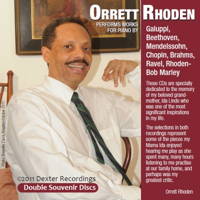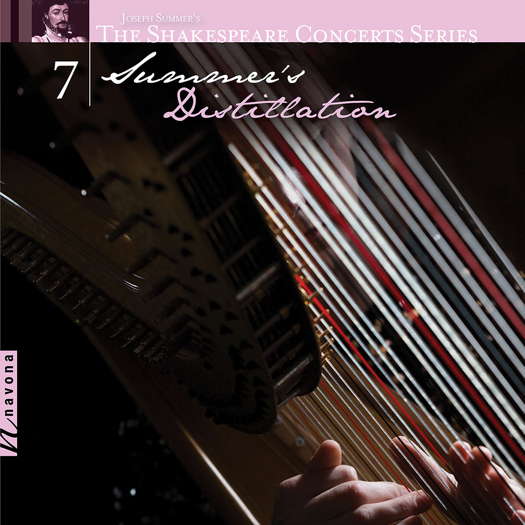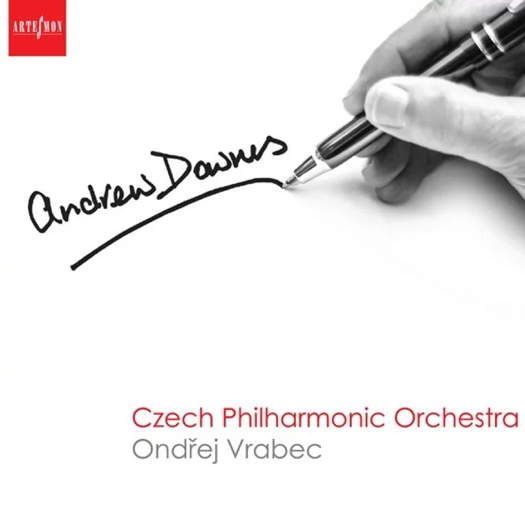 SPONSORED: CD Spotlight. Most Remarkable - Jamaican pianist Orrett Rhoden, heard by Bill Newman.
SPONSORED: CD Spotlight. Most Remarkable - Jamaican pianist Orrett Rhoden, heard by Bill Newman.
All sponsored features >>

An Experimental Shake
ONA JARMALAVIČIŪTĖ listens to Shakespeare settings by Brahms, Schumann, Pesetsky and Summer
'... the experiment ... should be praised for its courage and innovation ...'
Dedicated to all Shakespeare and classical music lovers, this CD is the seventh in the series of Shakespeare concerts. This tradition started in the year 2003 with recitals of music inspired by composers from the classical period to the 21st century combined with texts by the one and only William Shakespeare. Over the seventeen years, six CDs were successfully published and many composers from the USA, Czech Republic, China and South Korea participated in this initiative. The authorship of this project goes to the composer Joseph Summer, who had written about fifty so-called 'Oxford Songs' based on Shakespearean plays and sonnets that culminated with the opera Hamlet in the year 2006. According to him, Shakespeare concerts stimulate a wide-ranging dialogue on the relevance of Shakespeare in the 21st century.
Listen — Robert Schumann: Thy Days Are Done (Drei Gesänge)
(track 10, 0:00-0:47) © 2019 Navona Records LLC :
Recently the seventh album was released, filled with premieres of two dozen works - timeless texts of William Shakespeare set together with music of Johannes Brahms, Robert Schumann and Benjamin Pesetsky. The CD was named Summer's Distillation after Shakespeare's fifth sonnet. The most distinctive element of the CD - the unique instrumentation of voice, harp and horns - was inspired by the German composer of the Romantic period, Johannes Brahms, and his four songs for women's chorus, horns and harp. Joseph Summer remembers his first encounter with this Brahms piece as shocking and emotionally moving. In the CD notes he describes this experience in such words as 'music as transcendent epiphany' that 'changed the course of my life'. It influenced him to compose his first pieces for this unusual combination of instruments. These first pieces were written for harp and voice (Sonnet CIV), latter adding horns, women's choir, soprano and tenor (Sonnets V, VI, LXXIII, XCI, and CXXXIII). Other pieces on this CD are 'If by Your Art' (The Tempest), 'O God, That I Were a Man' (All's Well That Ends Well), Robert Schumann's Drei Gesänge, Op 95, Johannes Brahms' Vier Gesänge, Op 17 and Benjamin Pesetsky's Answer and Question (All's Well That Ends Well).
Every sonnet is set in different expression. Sonnets V and VI feel raw and unfiltered with their strong vocal harmonizing and complex tonal language. Sonnet LXXIII for vocal ensemble, harp, and horns paints a scene full of textural cacophony when different soloists take turns. Sonnet XCI, for voice and horns feels different - more regal and declamatory. Sonnet CIV is an art song for mezzo soprano Sophie Michaux with harp accompaniment. It sounds simultaneously heavy, expressive and graceful. Sonnet CXXXIII presents a duet for tenor and soprano against harp and horns, as a metaphorical complaint about prorogued agreement to accept an offer of love.
Listen — Joseph Summer: Sonnet CXXXIII
(track 5, 4:56-5:50) © 2019 Navona Records LLC :
'If by Your Art' from The Tempest is a soprano aria powerfully performed by Jessica Lennick, moving from pain to sweetness, followed by atmospheric harp accompaniment by Franziska Huhn, filled with echoed scale fragments. This is followed by 'O God, That I Were A Man' from All's Well That Ends Well - a monologue based on music by Robert Schumann, based on Keith Owen's horn playing and Thea Lobo's vocals. The performance impresses with the prowess, technical acrobatics and emotional impact of both musicians.
Near the end, music by Johannes Brahms himself is presented. His Vier Gesänge Op 17 unfolds four movements in which operatic vocals and twinkling harp are conjoined. The last piece, 'Answer and Question' from All's Well That Ends Well, is based on the music of Boston composer and writer Benjamin Pesetsky. The CD ends with multiple vocals complementing each other well in the sublime exit.
Listen — Benjamin Pesetsky: Answer and Question
(track 15, 5:17-6:17) © 2019 Navona Records LLC :
The listener is also able to access study scores, text selections and extended liner notes that makes the listening experience richer in cultural context, allowing understanding and appreciation of Elizabethan-era poetics. Summer's style and viewpoint hints at the myriad possibilities for expression within these texts.
With his own works at the core, Summer has been organizing the Shakespeare Concert series for more than a decade now, highlighting some of the many operatic, art song and chamber music works which use Shakespeare as inspiration. For me, not all contemporary musical experiments have meaning and quality value for the sake of experimenting itself. The original idea of combining two well-known elements in a new way fascinates. The compositions contain musical ideas of Brahms and poetry by Shakespeare. Yet the artistic result and quality of music expression does not fulfill its potential. The link between text and music at points did not come across as organic and meaningful. The unique instrumentation sometimes felt not recovered or fulfilled in ways it could have been. Harmonies lacked naturalness and effectiveness in a musical sense. Therefore it is hard to enjoy the experiment, which should be praised for its courage and innovation, but not for its artistic expression.
Copyright © 28 August 2020
Ona Jarmalavičiūtė,
Vilnius, Lithuania

CD INFORMATION: THE SHAKESPEARE CONCERTS SERIES 7
FURTHER INFORMATION: ROBERT SCHUMANN
FURTHER INFORMATION: JOHANNES BRAHMS
FURTHER INFORMATION: NAVONA RECORDS
FURTHER ARTICLES ABOUT THE UNITED STATES OF AMERICA



